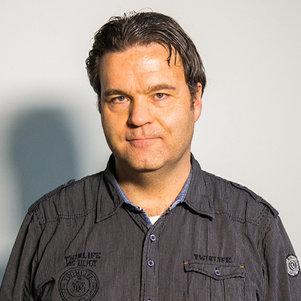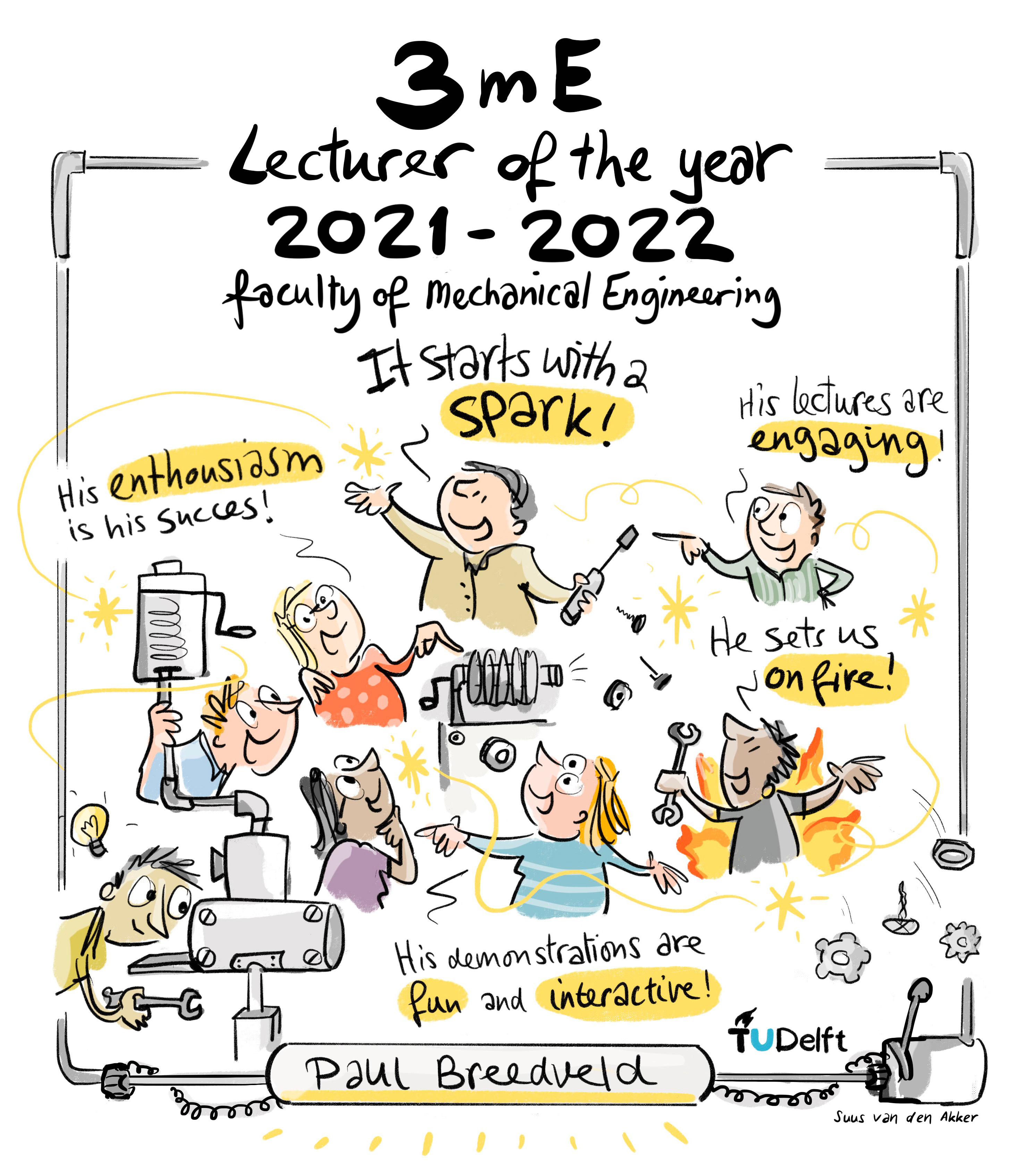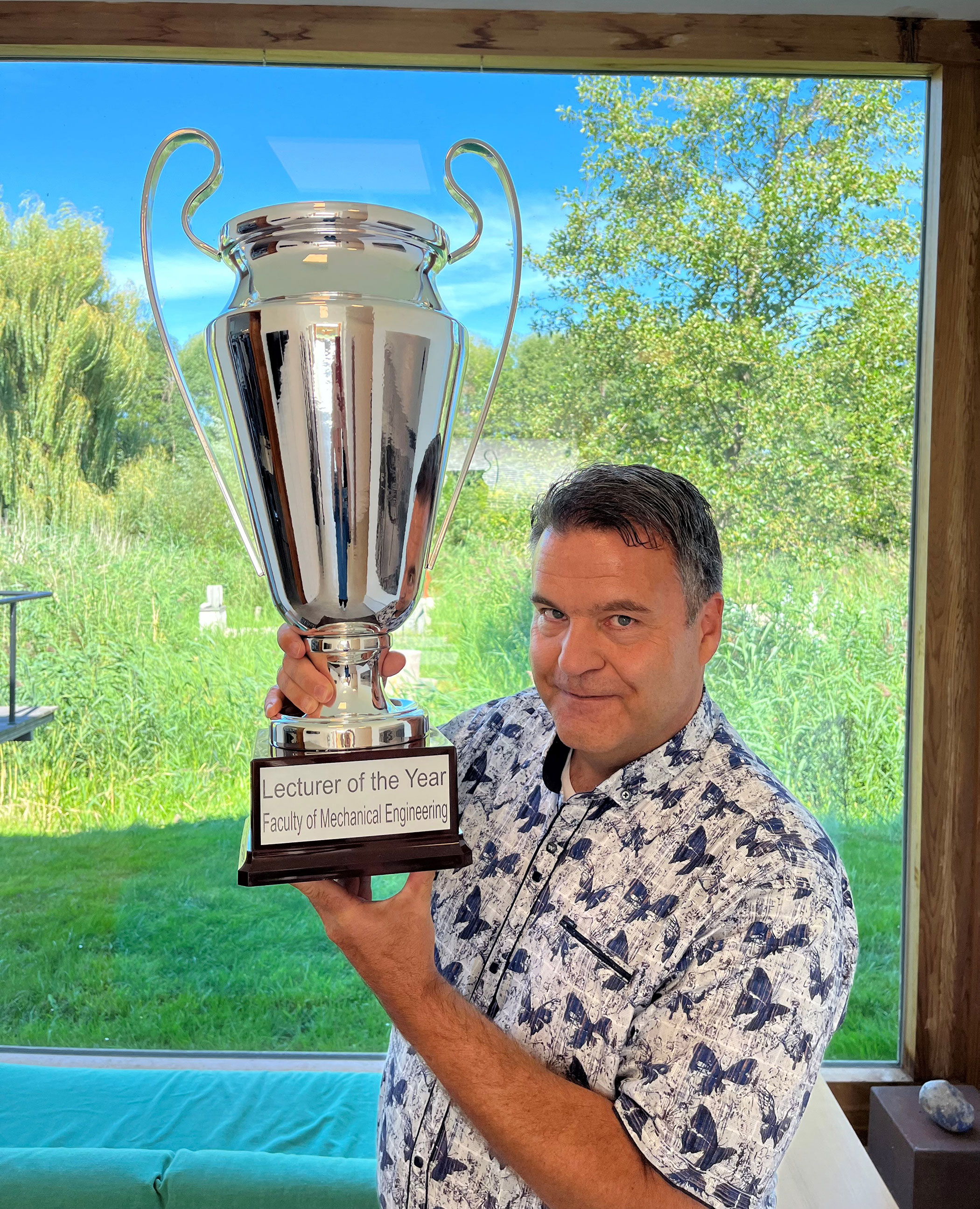Paul Breedveld best lecturer of 2021 - 2022
All students at the 3mE faculty were given the opportunity to vote for the best lecturer of 2021-2022. The votes are a token of their appreciation for the unique and creative way in which the lecturers concerned teach. Good lecturers are indispensable for the quality of 3mE’s programmes.
The student associations at 3mE (Variscopic, Froude and Leeghwater) have chosen the best lecturers for each programme and year based on the survey results. See the overview below. As icing on the cake, a best lecturer of the entire 3mE faculty was also chosen. After all the faculties have put forward their best lecturers, a nomination round will take place for the ‘Best Lecturer at TU Delft 2022’.
The first thing that hits you when you walk into Paul Breedveld’s room is the impressive ‘challenge cup’. The day after the presentation, Paul could not find his trophy. A colleague had put it so high up on a cupboard that Paul couldn’t see it.
His first reaction when he heard that he had been elected lecturer of the year was: ‘How nice!’ He has already been chosen best lecturer of the third-year mechanical engineering bachelor programme several times, and now he is the best lecturer of the faculty. Yet he remains modest: ‘Of course, there are many good lecturers.’
His passion and enthusiasm for the course on Integrated Mechanical Systems (IMS) stands out when reading the student reviews about Paul Breedveld. ‘The motivation in the way he conveys the subject is admirable,’ writes one of his students. ‘He has a true passion for his profession, which is reflected in his lectures.’ Yet another writes: ‘His lectures are colourful, and he knows how to keep you interested.’

P. (Paul) Breedveld
- +31 15 27 85232
- P.Breedveld@tudelft.nl
-
34.E-3-320
‘It starts with a spark’
The success behind his way of teaching is enthusiasm: Paul Breedveld takes immense pleasure in teaching his course. He designed the course a few years ago with a number of colleagues. The aim was to teach students to design better by looking at ingenious existing designs and learning to understand how they work. Many machines are like a polder model in which almost all aspects of mechanical engineering are incorporated in a wonderfully integrated whole. The trick is to learn to look through that complexity to see the essence of how it works. Students love the stories about the professor tackling a problem with a screwdriver and how things sometimes go wrong. That appeals to them a lot. ‘I’m actually a student too, I’m just 30 years older,’ says Paul. He believes that it all starts with a spark, and if manage to make people enthusiastic with that, they will learn on their own. The most important thing is to transfer the spark, and the actual transfer of knowledge will happen by itself a bit further down the line.
Interactive
The trick is to teach 400 students interactively and in such a way that it doesn’t feel forced. Paul always asks a lot of questions and does his best to involve the students in his lectures, for example through the many demonstrations in the lecture hall of mechanical calculators and pieces of car engines and transmissions. During the pandemic, it was more difficult to engage the students as he couldn’t give live demonstrations. His solution was to put the device on the table at home with a camera on it with a Zoom connection. Students could tell him which buttons to press and what to do with the device. In this way, the lecture became interactive.
Paul also often works with a cliffhanger. He sends students into their break with a provocative question that they can think about over a cup of coffee. After the break, the surprising solution to the question is revealed. ‘This keeps it interesting for the students.’
Last academic year, Paul gave a ‘gift’ to the students who attended the IMS lectures in the hall until the end. They were given a tour of the vast ‘study collection’ at the Faculty of Electrical Engineering, Mathematics and Computer Science with objects such as unusual old computers, telephone systems and clocks.
BSA helps to make choices
When asked if Paul has seen the students change, he replies: ‘The students have not changed. They are just as motivated and driven as they were 10 to 15 years ago. What has changed is that you can now find almost everything on the internet. It used to be easier to think for yourself, because otherwise you had to go all the way to the library.’
Years ago, you still had the ‘eternal student’; but since the ‘hard cut-off point’ and the ‘binding recommendation on the continuation of studies (BSA)’ were introduced, this is no longer possible. Of course, this puts more pressure on the students, but on the other hand, it also protects them because it forces them to make choices and not get stuck in a study that’s actually too complicated. Indeed, Paul thinks that this has improved things.
Career
When asked how his career went, he is clear: ‘I came here to study in 1987 and never really left.’ Paul started as a mechanical engineering student. At the time, the programme was so boring the first year, with months of courses on rivets and bolts, that he considered quitting. Only in the second year did he finally get a course on ‘how a CD player works, with very interesting mechatronic designs.’ That's what he was there for, and that’s when he finally became enthusiastic. After that, he did his PhD and Postdoc at 3mE and went on to become a professor.
The main reason he stayed at 3mE is that his group develops many special medical instruments inspired by smart solutions in nature. At TU Delft’s DEMO central workshop, he has two experienced instrument-makers working full time just for his group. The smallest and most complicated parts can be made and assembled here, allowing them to create truly cutting-edge technology in teams of researchers and instrument-makers. Few universities have these facilities. ‘When you have a mechanical design group, there isn’t really any reason to go anywhere else.’
Best lecturers Mechanical Engineering 2021 - 2022
Bachelor
Mechanical Engineering:
- 1st jaar: Matthijs Langelaar - Strength of Materials
- 2nd jaar: Nitin Myers - Signal Analysis
- 3rd jaar: Paul Breedveld - Intergrated Mechanical Systems
Maritime technology:
- 1st jaar: geen selectie gemaakt
- 2nd jaar: geen selectie gemaakt
- 3rd jaar: Apostolos Grammatikopoulos - Complex loads and vibrations
Clinical technology:
- 1st jaar: Jochem Nagels (LUMC)
- 2nd jaar: Bob van Vliet - Designing Medical Technology
- 3rd jaar: Erik van den Akker (LUMC / EWI)
Master
- Biomedical Engineering: Maarten van der Elst
- Mechanical Engineering: Daniel Tam - Advanced Fluid Dynamics
- Systems & Control: Peyman Esfahani Dynamic - Programming and Stochastic Control
- Offshore & Dredging Engineering: Hayo Hendriksen - Intro Offshore
- Maritime Technology: Michael Bessa - Non-metalic materials
- Robotics: Dario Gavrila - Intelligent Vehicles
- Materials Science Engineering: Poulumi Dey - Structure and Properties of Materials
- Technical Medicine: Laura Graven (EMC)

